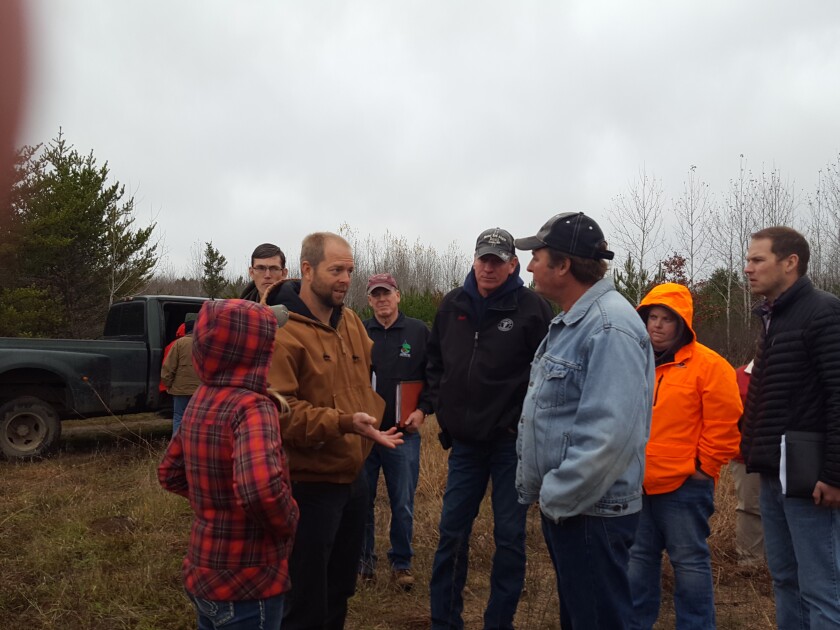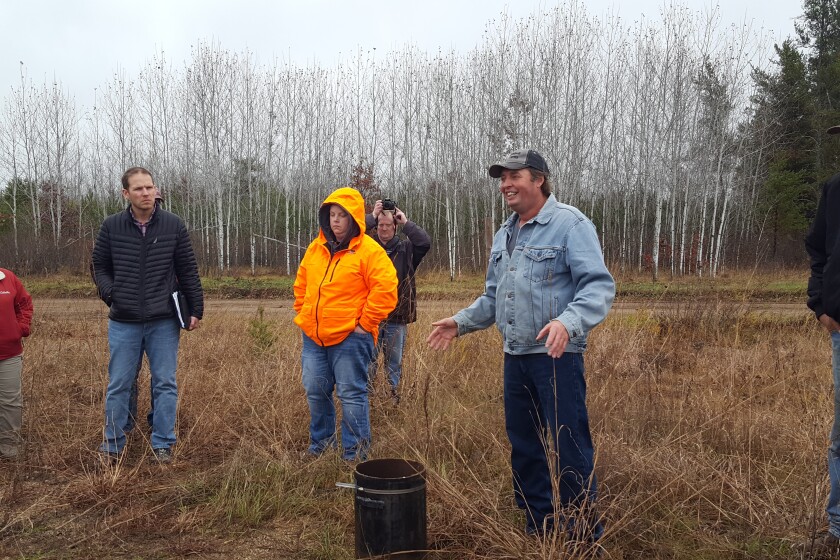SEBEKA, Minn. — Tim Nolte raised livestock and grew crops in Wadena County for decades before he found himself at the center of a hotly contested legal dispute over his application for permits to irrigate 300 acres in Minnesota’s fragile Pineland Sands region.
Nolte’s project is viewed by environmental groups as a front for R.D. Offutt Farms, the nation’s largest potato grower, which several years ago planned to expand its considerable farming operations in the Pineland Sands by 7,000 acres.
ADVERTISEMENT
The RDO proposal could have triggered an extensive environmental impact statement by the Minnesota Department of Natural Resources, and the company backed away from the major expansion.
Environmental groups are suing to try to force the DNR to conduct a more thorough environmental review of Nolte’s irrigation project — a dispute that will be decided soon by the Minnesota Court of Appeals.
Nolte bristles at claims that he is beholden to RDO or is operating on its behalf. But he said he should be entitled to do as he pleases with his land, as long as it’s legal and not damaging the environment.
The irrigated land in question is used to grow corn and cover crops to feed his cattle, with hay being his farm’s primary crop, Nolte said.
“This is a private property rights issue to me,” he said. “We’ve won conservation awards. We’re livestock farmers,” not potato growers.
Nolte said he has no plans "this year" to use his irrigated land to grow potatoes, but wants to keep his options open, noting that his operation has changed significantly in his 30 years of farming. So he doesn’t rule out the future possibility of working with RDO or other large farming operators.
“If we want to work with them in the future that should be our freedom,” as long as he’s not breaking laws or environmental regulations, he said.
ADVERTISEMENT
For decades the forested Pineland Sands were a timber reserve harvested for the paper industry. But Potlatch Corp. sold its timberland holdings in the area, many of which were converted to irrigated farmland, causing growing environmental and health concerns among nearby residents.
The environmentally sensitive Pineland Sands is an area of 770 square miles covering Wadena, Cass, Becker and Hubbard counties that drains into the headwaters of the Mississippi River. It features sandy soils and shallow aquifers.
That combination makes it vulnerable to contamination and depletion of groundwater sources that provide drinking water for residents. Drifting of pesticides applied by helicopter sprayers also is a concern for neighbors with land adjacent to the irrigated farmland.
After RDO sidelined its planned expansion, it entered into agreements with Nolte that today are a focus of the lawsuit to determine whether the Minnesota DNR should conduct an environmental impact statement of the irrigation project on the land Nolte bought from RDO.
A group of environmental advocacy organizations including the Environmental Working Group argues in the lawsuit that an environmental impact statement is required because Nolte’s project is a thinly disguised effort by RDO to resurrect its once-planned expansion of its potato growing in the Pineland Sands, though in a piecemeal fashion using other landowners like Nolte to avoid triggering an extensive environmental review for a single, large expansion.
RDO is not a party in the lawsuit and no longer owns the land in question, a company spokeswoman said. “We’re bystanders,” said Tara May, RDO’s vice president for communications and external affairs. “We sold some property to a neighbor. It made sense for us to do that.”
May declined to comment, however, on any possible future RDO plans to expand its potato-growing operations in the Pineland Sands.
ADVERTISEMENT
Jamie Kanopacky, a lawyer and Minnesota director for the Environmental Working Group, said the DNR has failed to adequately scrutinize the Nolte project and its relationship with RDO.
“The record reflects that DNR really shoved this thing through,” giving little time for other agencies to review its decision not to require an environmental impact statement, she said.
The DNR’s conclusion that there would be “low” or “negligible” nitrate contamination from the 300-acre project ignored an independent water specialist’s concerns. “In this case, what they did is ignore the science,” Kanopacky said.
Drinking water concerns
George Kraft, a water quality specialist who worked for many years at the University of Wisconsin-Stevens Point, said the DNR’s evaluation of Nolte’s irrigation permits failed to provide any meaningful discussion of the likely impacts of pumping on water levels and stream flows.
Kraft said the DNR also failed to “evaluate the potentially significant nitrate loads to groundwater and surface water.” The crop rotation likely will result in a nitrate load double to quadruple the level required to adhere to the Safe Drinking Water Act limit, Kraft said.
In response, the DNR said it did consider Kraft’s concerns, and addressed the issues raised, but concluded the project didn’t have the potential for local environmental concerns.
ADVERTISEMENT
When RDO proposed the 7,000-acre expansion in 2014 and 2015, the company was seeking multiple irrigation permits.
Faced with the possibility of a rigorous environmental review, RDO struck an agreement with the DNR to temporarily roll back its irrigation permit applications and associated well assessments from 54 to two and gave temporary support to a regional study, according to the lawsuit. The DNR did not require the extensive environmental review.
Nolte initially acquired the property from RDO with a contract for deed. RDO agreed to sell the project site, including cleared land and irrigation wells, to Nolte for $1.13 million, according to the environmental plaintiffs' lawsuit. The 300 irrigated acres are part of a purchase of 640 acres of land from RDO, Nolte said.
In return, Nolte was to resubmit three of RDO’s 2015 irrigation applications and lease back the land to RDO for potato farming, Environmental Working Group and other environmental advocates argue in court documents.
In 2017, Nolte resubmitted RDO's 2015 applications, according to the environmental parties pushing for the environmental review. Ultimately, the Minnesota DNR decided that any contamination or pesticide drift from Nolte’s planned irrigation project would be “low” or “negligible” and determined that the project was too small to warrant a lengthy and costly environmental impact statement.
In December 2018, however, the DNR raised concerns about the ownership of the irrigation project property. As recently as April 2019, Nolte had told DNR officials that he planned to lease the project site to RDO to grow irrigated potatoes, according to the environmental plaintiffs.
'I'm free and clear'
Amid scrutiny from the DNR, RDO and Nolte removed the potato lease provision from the contract for deed and Nolte told the DNR he would buy the property “outright.”
ADVERTISEMENT
Nolte, who now has a warranty deed for the former RDO land, said he owns the land “outright” and the purchase is financed by a local bank.
“I’m free and clear to do what I want with it,” he said. "I don't have any ties to anybody."
The DNR has concluded that Nolte is in fact the landowner and is operating independently of RDO.
Arguments that the Nolte project is a “sham” and part of RDO’s once-planned 7,000-acre expansion are speculative and not supported by the evidence, the DNR argued in its response to the lawsuit.
“But this claim fails because no 7,000-acre expansion ‘project’ within the meaning of the Minnesota Environmental Protection Act currently exists, and even if it did, substantial evidence supports the DNR’s determination that the Nolte project is independent of R.D. Offutt,” the DNR argued.
Still, the DNR is concerned about potential cumulative impacts from further irrigation in the Pineland Sands, and acknowledges that wells in some townships in the area have nitrate levels 10% above levels deemed safe for drinking water.
“That was really the concern we have,” said Randall Doneen, a senior DNR administrator whose section oversees water permits and environmental reviews. “Mr. Nolte is a relatively small contributor to this environmental effect,” he said. Also, there was not a lot of other irrigated farmland upstream or downstream of Nolte’s fields in the area.
ADVERTISEMENT
Doneen noted, however, “He’s adding to these other effects from other parties,” resulting in potential cumulative effects of concern.
The DNR now is issuing only “limited” irrigation permits in the Pineland Sands, which involve monitoring, can come with additional requirements and might not be renewed, he said.
Arguments for a comprehensive environmental impact statement for the Nolte project have no merit, the DNR said. “The record overwhelmingly shows that the DNR took a hard look at the water quality, water quantity and pesticide effects that are the focus of the … appeal,” the DNR wrote.
For years, the DNR has wanted to study the cumulative environmental impacts of irrigated farming in the Pineland Sands, but lawmakers haven’t appropriated money for a study. Together with sister agencies including the Minnesota Department of Agriculture, Minnesota Pollution Control Agency and Minnesota Department of Health, the DNR will conduct a data collection effort to get a better handle on irrigation effects using existing resources, Doneen said.
At the same time, “We’re definitely paying very close attention to any new applications for water in the Pineland Sands,” he said.
Recently, there have been only a few applications, none involving RDO or other large farming operations, Doneen said.











